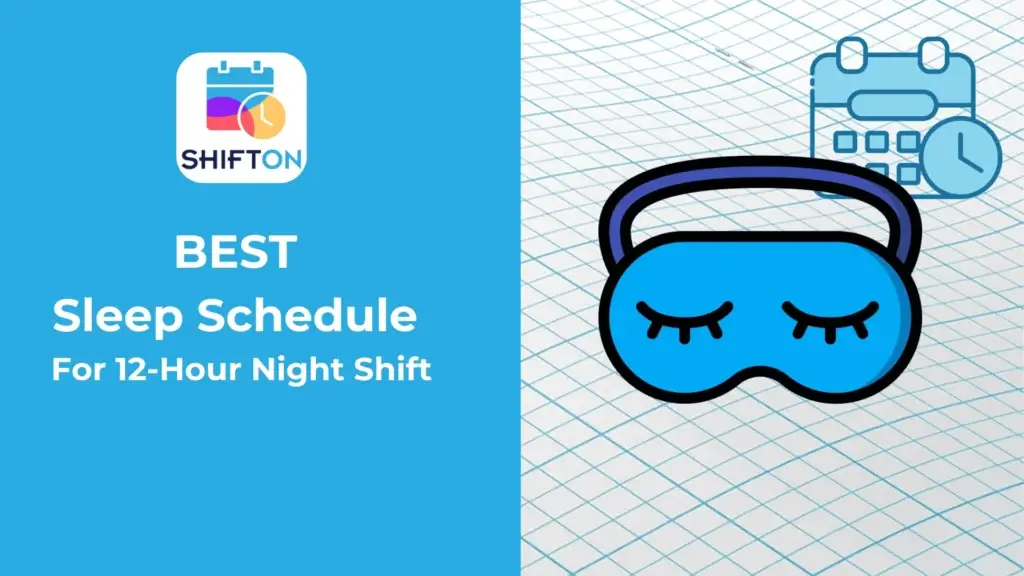Working a 12-hour night shift can be tough on your sleep. Discovering the best sleep routine is crucial for keeping your energy up. Here’s a 12-hour shift schedule example using Shifton to make sure you’re getting proper rest.
Who Typically Works 12-Hour Night Shifts
The
12-hour working shift entices workers from various domains, including medicine and manufacturing. EMTs and paramedics, providing 24-hour care to patients, are prime examples. Hospitals always need doctors, nurses, and nurse practitioners ready to offer immediate aid, especially in emergencies. Night work demands special psychological resilience, given the frequent high workloads and stress associated with night roles. Workers in services like security, cleaning, and hospitality are equally vital at night. Security personnel keep facilities safe, cleaners maintain tidiness, and hotel staff ensure guests have a comfy stay.
7 Major Challenges of Working 12-Hour Night Shifts
Working 12-hour night shifts often becomes necessary for many but comes with a series of significant issues affecting workers' physical and mental well-being. In this article, let’s delve into seven primary issues linked with lengthy night shifts.
Disrupted Circadian Rhythms
The human body operates on internal circadian rhythms that control the sleep-wake cycle. Night shifts can upset this equilibrium, leading to several outcomes. Workers might face sleep troubles like insomnia or light sleep. As their bodies can't fully adapt to the new
sleep schedule for night shift workers, they might suffer from persistent fatigue, decreased productivity, and heightened health risks. Chronic disturbances to circadian rhythms might also elevate risks for chronic diseases such as heart disease and diabetes.
Increased Risk of Errors
Night work demands high concentration, but the fatigue and delays in functional recovery post-shift can drastically affect attention spans. Faulty attention can lead to a rise in errors, potentially impacting safety severely, mainly in high-risk industries like healthcare, transport, and heavy industry. Mistakes during the night shift can result in not just operational issues but also serious accidents, adding health risks for both workers and those around them.
Health Risks
The long-term health implications of night work are a key matter for many medical studies. Those on night shifts have elevated risks for various health issues, including insomnia, stress disorders, and digestive problems. People are likelier to snack on lighter or carb-laden foods at night, leading to weight gain and associated issues. Moreover, research indicates shift work might raise cancer risks, especially breast cancer among women, heightening concerns about this matter.
Mental Health Strain
Working night shifts isn't solely physically exhausting but also imposes notable pressure on mental health. Imbalance in resource allocation between work and leisure might induce constant isolation feelings and depression. Night shifts sometimes tempt workers to view work as an escape from psycho-emotional issues, potentially leading to substance misuse. Inability to engage in community and social activities due to non-standard schedules worsens mental health, highlighting the need for considerable focus on this issue.
Social and Family Impact
Night shifts affect not just workers' health but also their family and social relationships. The
best sleep schedule for night shift workers can make maintaining social bonds and interacting with loved ones tougher. This can trigger guilt or perceived neglect of family, sparking conflict and misunderstandings. Even simple family events can become challenging for workers, adding to stress and tension. Interaction difficulties accumulate, creating a void in family ties that's hard to fill.
Workplace Safety
Night shifts also come with increased accident and safety risks. After-dark hours, when most are resting, present extra challenges, like loss of vigilance and heightened risk in crime-susceptible areas. With often reduced security checks at night, workers are more exposed. Enhancing security with more guards or technology can mitigate some risks, though full coverage everywhere isn't feasible.
Difficult Recovery
After lengthy shifts, recovery is tricky for workers. Transitioning from insomnia and stress to a normal state is lengthy, often leaving employees with physical and emotional fatigue. Lack of recovery impacts life quality by worsening sleep issues and piling up stress. Insufficient rest changes how employees see their work, turning it into drudgery and affecting motivation and satisfaction, creating a negative cycle.
Sleep Tips And Strategies For Night Shift Workers
Night work may offer rare career advancement opportunities but brings notable health and sleep hurdles. To reduce night work’s adverse body effects, follow certain
sleep tips for night shift workers and strategies to boost your sleep quality. So,
what is a good sleeping schedule?
When Should I Sleep When Working Night Shifts
Night shift workers should devise a customised
night shift workers sleep schedule aligned with their work hours. The best routine might involve sleeping before your shift starts. For instance, if your shift kicks off at 22:00, aiming to sleep around 14:00 or 15:00 is optimal. This gives your body ample rest time. Avoid unnecessary changes to your sleep routine: consistency is crucial for your body to adapt to new settings.
How Do I Sleep During The Day To Prepare For A Night Shift
Daytime sleep may be tricky due to natural light, impacting the
best sleep patterns for night shift. To enhance your sleep atmosphere, consider these tips:
- Create a dark space: Employ eye masks or thick curtains to block sunlight.
- Use extra soundproofing: Noise can disrupt sleep, so headphones or sound machines can help create a quieter environment.
- Maintain a comfortable temperature: Day sleep is easier in a cooler room.
- Keep a routine: Stick to your sleep schedule, even on weekends, for quicker body adaptation.
Now, do you understand
how to sleep when working night shift?
How Does Working Overnight Affect Your Sleep
So,
how to change your sleep schedule for night shift? Night shifts might cause several sleep issues. These include:
- Decreased sleep quality: Daytime sleep often lacks depth and is shorter than night sleep.
- Problems falling asleep: Workers may face trouble falling asleep even during their available sleep time due to biological clock changes.
- Increased anxiety and stress: Night work and insufficient rest might lower resilience to stress.
These elements can worsen health overall and cause chronic fatigue. You must grasp
how to adjust to working night shift properly.
What Is The Healthier Way To Work The Night Shift
Caring for your health significantly impacts your night work quality. Consider these tips:
- Eat right: Optimise your diet by reducing sugar and caffeine. Prioritise proteins, veggies, and complex carbs to sustain your energy.
- Take regular breaks: Use work breaks for recovery. Every few hours, pause to stretch and move your body.
- Physical activity: Exercise not only benefits health but also helps you stay alert during your shift. Opt for light activities like walking or short cardio sessions.
These tips clarify
what is the best sleep schedule.
Do Night Shift Workers Need More Sleep
Indeed, night shift workers might need extra sleep to offset the reduced sleep quality. Adults generally need 7-9 hours per night, but night shift workers may require an additional 1-2 hours. The extra sleep aids in maintaining energy levels and productivity amidst routine disruptions.
How Long Does It Take To Adjust To The Night Shift
Adjusting to night shifts is personal, possibly taking from a few days to several weeks. Typically, organisations suggest allowing at least 1-2 weeks for the body to adapt to the new routine. However, this can differ based on an employee's health, age, and lifestyle.
5 Different 12-Hour Night Shift Sleep Schedule Examples
Night shift work demands flexibility and adaptation to unusual sleep patterns. The body’s design requires stability and regularity. So, for those on 12-hour shifts, it’s not just about how much sleep they get but how it’s structured. Let’s explore five
12-hour shift schedule examples.
The Consistent Schedule: Sleep from 8 AM to 4 PM
This schedule involves the employee sleeping from 8:00 am to 4:00 pm, which is ideal for those whose shifts start late in the evening, such as at 6:00 pm or 8:00 pm. This sleep schedule allows the body to adapt as it sets certain hours when rest is needed. It's important to maintain this routine regularly, even on weekends. Consistency helps the body begin producing the necessary hormones during sleep, which improves its quality.Additionally, it's important to consider external factors to enhance the sleeping environment. Ideally, you should create a dark and quiet space by using thick curtains and earplugs. This will help eliminate sunlight and noise that can disrupt the sleep cycle. You should also ensure your bedroom is at a comfortable temperature so your sleep is deeper and longer. This schedule helps avoid sudden mood swings and fatigue, which is especially important for maintaining performance during night shifts.
The Split Sleep Schedule: Sleep from 8 AM to 12 PM and from 5 PM to 7 PM
This schedule involves dividing sleep into two blocks: the first from 8:00 to 12:00 and the second from 17:00 to 19:00. This allows the employee to use the time between the two sleep sessions more productively, to attend to personal matters or to prepare for work. This approach is designed for those who want to optimise their working hours and maintain efficiency throughout the day, despite the lack of time for a full night's sleep.To implement such a schedule, it's important to organise the second block of sleep correctly. You should turn off all possible sources of distraction - phone, TV, and other gadgets - in advance. This will ensure a deep sleep even in a short period of time. It is also important to remember that a short nap, especially in the first half of the day, can help improve cognitive function, making it useful for working or studying the rest of the day. You should stick to the routine so that the second block doesn't disrupt the main sleep cycle.
The Nap-Focused Schedule: Sleep from 9 AM to 5 PM with an evening nap before work
This schedule assumes that the employee sleeps during the day from 9:00 to 17:00 and then takes an additional rest before work. This approach provides 8 hours of pure sleep and also allows for sleep before the start of the shift. For example, after an afternoon nap, it's advisable to lie down for 1-2 hours before work to help avoid fatigue and increase concentration levels. Organising sleep during the day can be tricky, especially for those who aren't used to sleeping when the sun is shining.
The Early to Bed Schedule: Sleep from 7 AM to 3 PM
This schedule implies that the employee sleeps from 7:00 am to 3:00 pm. It's suitable for those who prefer to wake up early but work night shifts. An example would be workers whose shifts start at, say, 20:00. This schedule allows people to complete their main tasks in the first half of the day, be active and still get quality rest.For good quality sleep on this schedule, it's important that the evening and night be as restful as possible. The employee should create an environment where sleep is not interrupted - minimise evening distractions and stress before bedtime. In this context, it's also important to protect personal space from extraneous sounds, including the use of white noise or sound backgrounds to improve sleep quality.
The Late Sleeper Schedule: Sleep from 10 AM to 6 PM
The last example assumes that the employee sleeps from 10:00 to 18:00. This schedule is suitable for people working shifts starting at 20:00 or 22:00. Going to bed late allows someone to work productively and also maintain the habit of exercising during regular working hours. The employee will then get 8 hours of sleep, which in turn aids in the recovery of the body.Another important aspect with this schedule is scheduling time for rest and hobbies between shifts. It leaves room to organise evening activities and personal life, which makes it more balanced - evening activities before the night shift can help boost motivation and mood levels. To effectively focus on work activities, it is important to keep your own needs and preferences in mind.However, it's worth noting that this schedule also has its risks. In some cases, balancing the number of hours of sleep can lead to stress if an employee has difficulty falling asleep at night due to external factors. To manage this problem, it may be necessary to optimise the sleeping environment - use dark curtains, avoid overly bright screens before bedtime, and stick to a restful routine, even at weekends.
10 Best Practices to Adjust Sleep Patterns to Long Night Shifts
Organising a sleep routine for long night shifts is a major challenge that requires attention to the various factors that affect the quality of rest. If you work nights, following certain practices can significantly improve your wellbeing and productivity. Let's take a look at the top 10 best practices for adjusting your sleep patterns for long night shifts.
1. Set a Consistent Sleep Time
Creating and maintaining a consistent sleep schedule is key to successfully adapting your body to night shifts. Try to go to bed and get up at the same time, even on weekends. This allows your internal biological clock to work more efficiently, helping your body get used to the new schedule.
2. Darken the Sleep Environment
Darkness promotes the production of melatonin, a hormone that is responsible for regulating sleep. Use blackout curtains or eye masks to block out light completely. Even small light sources such as appliance lights can interfere with your sleep, so try to minimise their influence.
3. Limit Caffeine Intake
Caffeine may raise your energy levels for a short time, but its effects can last up to several hours. Avoid drinking coffee, tea, and energy drinks 4-6 hours before bedtime. Remember, it's better to replace caffeine with water or herbal teas - not only will this help you sleep better, but it will also be beneficial to your health.
4. Create a Pre-Sleep Routine
Developing a routine before bed will help signal your body that it's time to rest. This can include activities such as reading, meditation, light stretching or listening to calm music. It's important to keep this routine consistent and soothing, which will help you relax faster.
5. Minimise Exposure to Bright Light Before Bed
Bright light, especially blue light (such as from phone and computer screens), can suppress melatonin production and interfere with your sleep. If possible, reduce your use of electronic devices an hour or two before bedtime. Instead, try engaging in something calmer and more relaxing.
6. Nap Strategically
If you have the opportunity to nap during your shift, take advantage of it. Short naps of 20-30 minutes can help restore your wakefulness and concentration levels. However, avoid long naps as they can lead to sleep inertia and make you more tired.
7. Use Noise-Masking Devices
Noise can be a serious hindrance to a good night's sleep. Use earplugs or noise-cancelling devices to create a comfortable atmosphere. You can also turn on white noise or quiet sounds to mask annoying sounds and help yourself sleep.
8. Stay Hydrated and Eat Healthily
Proper nutrition and hydration play an important role in your overall health. Avoid heavy foods before bed as they can cause discomfort and interfere with deep sleep. Focus on light snacks and ensure you drink enough water throughout the day to keep your body functioning optimally.
9. Avoid Long Commutes When Possible
Long commutes can add stress, especially if they occur during hours when your body is not ready for activity. If possible, take shorter routes or organise your schedule to minimise travel time. This will allow you more time to sleep and rest.
10. Exercise Regularly
Physical activity helps regulate stress levels, improves sleep quality, and increases your body's overall resilience. Make time for regular exercise that fits your schedule. This could be a morning workout before work or a short workout between shifts.
Key Takeaways on 12-Hour Night Shift Sleep Schedule
The
12 hrs of sleep schedule is a unique pattern that requires careful attention to rest and wakefulness management as it can have a significant impact on a worker's health, productivity and overall well-being. One of the key findings is that such long shifts require careful adjustment of personal sleep patterns to compensate for the lack of daylight and allow for full body regeneration. Often workers face problems related to disrupted
circadian rhythm, night shift, which can lead to chronic fatigue, increased anxiety, and even depression. Organising your working and personal time, as well as using relaxation techniques, can help to improve your overall performance and quality of life in the face of
12 hour night shift schedules!
Daria Olieshko
A personal blog created for those who are looking for proven practices.

 English (US)
English (US)  English (GB)
English (GB)  English (CA)
English (CA)  English (AU)
English (AU)  English (NZ)
English (NZ)  English (ZA)
English (ZA)  Español (ES)
Español (ES)  Español (MX)
Español (MX)  Español (AR)
Español (AR)  Português (BR)
Português (BR)  Português (PT)
Português (PT)  Deutsch (DE)
Deutsch (DE)  Deutsch (AT)
Deutsch (AT)  Français (FR)
Français (FR)  Français (BE)
Français (BE)  Français (CA)
Français (CA)  Italiano
Italiano  日本語
日本語  中文
中文  हिन्दी
हिन्दी  עברית
עברית  العربية
العربية  한국어
한국어  Nederlands
Nederlands  Polski
Polski  Türkçe
Türkçe  Українська
Українська  Русский
Русский  Magyar
Magyar  Română
Română  Čeština
Čeština  Български
Български  Ελληνικά
Ελληνικά  Svenska
Svenska  Dansk
Dansk  Norsk
Norsk  Suomi
Suomi  Bahasa
Bahasa  Tiếng Việt
Tiếng Việt  Tagalog
Tagalog  ไทย
ไทย  Latviešu
Latviešu  Lietuvių
Lietuvių  Eesti
Eesti  Slovenčina
Slovenčina  Slovenščina
Slovenščina  Hrvatski
Hrvatski  Македонски
Македонски  Қазақ
Қазақ  Azərbaycan
Azərbaycan  বাংলা
বাংলা 

